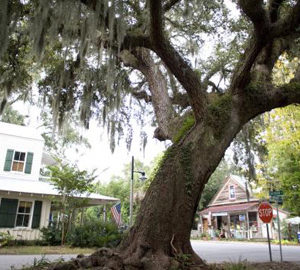We always say, “Bluffton is a State of Mind,” but it’s not just a saying around here; it’s a lifestyle and our town’s motto.
Why? Because the culture here in the burgeoning town of Bluffton, pulsating from local artists, businesses and residents is something quite different than our counterparts. From rushing waters of the May River to Old Town and The Promenade, where old homes have been transformed into shopping boutiques and art galleries, there’s something different and special about what we call “The Heart of the Lowcountry.”

It all has to do with our coastal craftsmen, artisans and artists selling work created right here, not to mention the restaurants serving locally-sourced delights—fresh seafood, fruits and vegetables from farms right down the way—and small shops full of Southern charm and unique finds. Without all of those things, there’d be no “Bluffton State of Mind” and “The Heart of the Lowcountry” would stop beating.
That’s why it’s so important to shop locally—it supports the local economy and promotes the growth of local businesses.
Spending dollars locally is the blood that keeps the heart pumping.
“If you spend your money at a local store, odds are they’re working with other local providers and strengthening that local network,” Emily McLeod Sulkes, the director of operations at IRMA Does Marketing and ShopMoreLocal.org, said.

It’s a simple concept they’re trying to convey, but much harder habits that may need to be broken. The convenience factor and opportunities to save that big box stores no doubt exists. However, buyers don’t have to break those habits completely. Shop More Local is starting small and encouraging locals to shift $20 of their weekly spending to a local business. Not spend $20 more, just shift $20 spent at a national retailer to a local one.
“If we shifted $20 more to locally-owned businesses per week, over the course of a year it would be a 57 million dollar impact on the county,” Sulkes explained.
How? Because local businesses tend to use more local resources and pay more local taxes. This keeps the money moving in the local economy. It stops the money from leaving town and going to the large retailers.
“It might be to take slightly more time to stop somewhere on the way home. But that there is really a worthy impact of doing so,” Sulkes said. “Shopping locally can help preserve that character and the diversity of things that are available here.”


